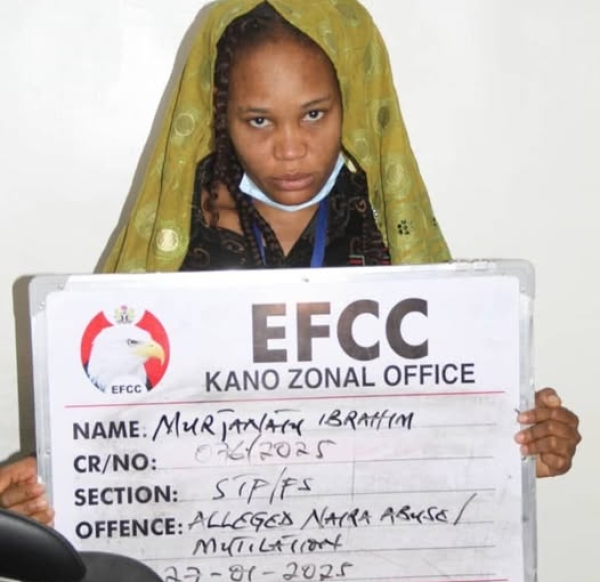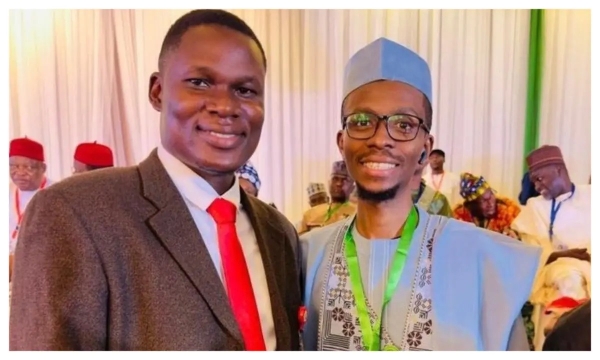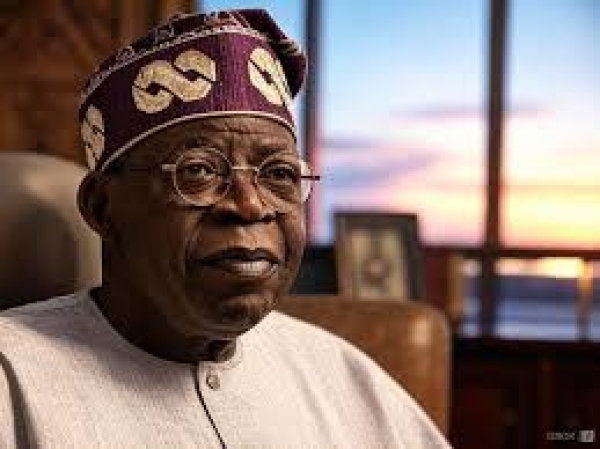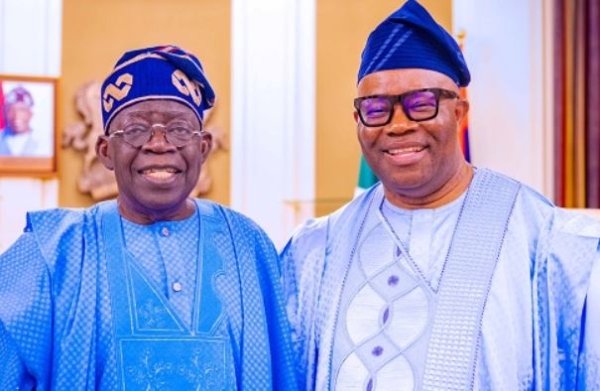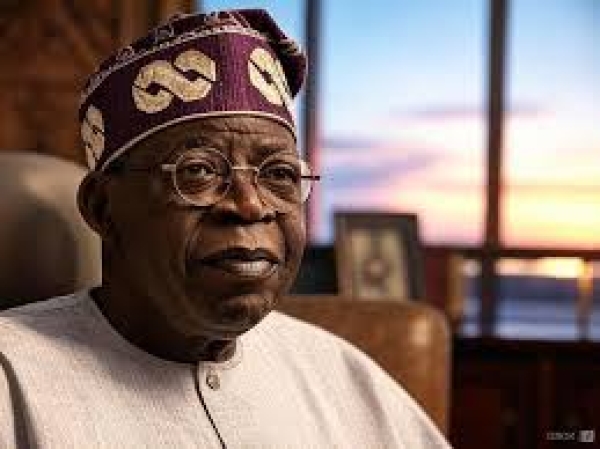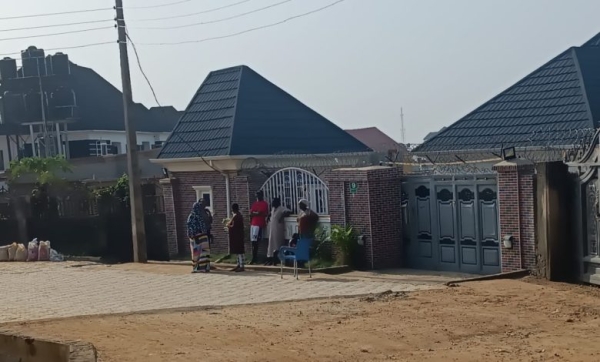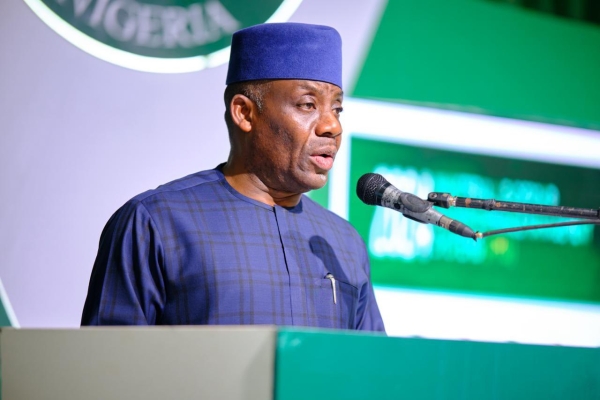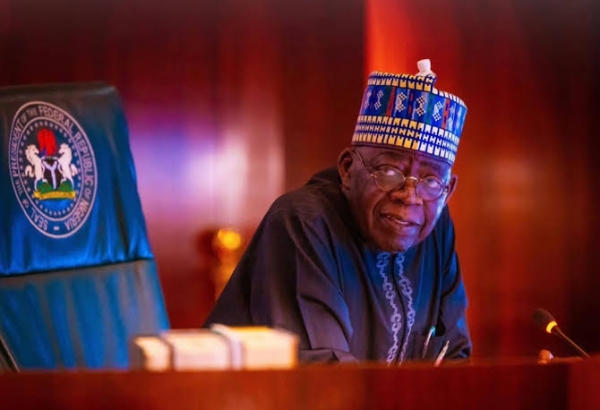TOP NEWS
Reuben's View
Latest News
Search
MOST READ
-
Tinubu must change his policies, he won’t win next election if it’s free and fair - says Onaiyekan
-
Mid-term: Security, economy improving under my watch — Tinubu
-
VIDEO: Priscilla Ojo, Juma Jux seal love story with grand wedding finale in Tanzania
-
How Obasanjo Changed Mind About Foreign Affairs Building – Sule Lamido Reveals
-
Nnamdi Kanu Admitted Smuggling Biafra Radio Transmitter Into Anambra – Witness Tells Court
-
DSS made me make confessional statements under duress - Nnamdi Kanu tells court
-
Over 10,000 people killed across Nigeria in Tinubu’s first two years as president – Amnesty International
-
Nigerians hit as Canada announces major changes to immigration policies
-
[OPINION] 26 Years of Democracy by Iberiberism - Olusegun Adeniyi
-
Nigerian TikToker, Murja Kunya Sentenced to six months jail Term for Naira Abuse In Kano
-
‘African Giant Burna Boy is dead’ – Singer says
763 times -
El-Rufai’s son, Bello abandons father, SDP, backs Tinubu for second term
575 times -
Pressure mounts on Tinubu to drop Shettima as running mate ahead of 2027
529 times -
Atiku, Sambo Meets Tinubu’s Ex-ally, Rauf Aregbesola
511 times -
Tinubu should be Nigeria’s sole presidential candidate in 2027, says Akpabio
500 times -
I Know Road, I Will Lead You to Promised Land — President Tinubu to Nigerians
486 times -
Ndume Makes U-turn, Hails Tinubu For Appointing Northerners To Key Positions
476 times -
40 gunmen raid popular Abuja estate, machete guards, rob residents
457 times -
85% Of Nigerian Foreign Scholarship Students Don’t Return - Minister Laments
450 times -
2027: Tinubu doing well, North will vote for him – Shagari
440 times








![[OPINION] Octopus Wike And The PDP - Reuben Abati [OPINION] Octopus Wike And The PDP - Reuben Abati](https://reubenabati.com.ng/cache/mod_bt_contentslider/199cf8910c41b2b56d33e3d5e66c8649-0c132d1dd795979de9db14cc333bbe4d_XL.jpg)
![[OPINION] Zulum And The Surge In Insurgency - Reuben Abati [OPINION] Zulum And The Surge In Insurgency - Reuben Abati](https://reubenabati.com.ng/cache/mod_bt_contentslider/ad6e52c43f66e3cf537b06ad38aa93b6-8ac05a2894b5e82aeee611e792497153_XL.jpg)
![[OPINION] Defections And Threat Of One-Party State - Reuben Abati [OPINION] Defections And Threat Of One-Party State - Reuben Abati](https://reubenabati.com.ng/cache/mod_bt_contentslider/e16351efb50f01266cc28b7377bd5e83-90b1922af682fff68852fa7fab5a4331_XL.jpg)
![[OPINION] Pope Trump, Adebanjo And Other Stories - Reuben Abati [OPINION] Pope Trump, Adebanjo And Other Stories - Reuben Abati](https://reubenabati.com.ng/cache/mod_bt_contentslider/a9c28326249471b0c6d135375d9aa6d3-66656381f38ceca0faf1a84f4c1885dd_XL.jpg)
![[OPINION] CBEX Wealth Chasers, NDIC And The Fate Of Depositors - Reuben Abati [OPINION] CBEX Wealth Chasers, NDIC And The Fate Of Depositors - Reuben Abati](https://reubenabati.com.ng/cache/mod_bt_contentslider/e7c29125e793371f688b9def0c150948-867aa1263f279020e1b930969b024a70_XL.jpg)
![[OPINION] Pope Francis (1936 – 2025) - Reuben Abati [OPINION] Pope Francis (1936 – 2025) - Reuben Abati](https://reubenabati.com.ng/cache/mod_bt_contentslider/9df20a858100040a45e2fc6915d65f41-c0395aa98d8919afead20f020215aa2b_XL.jpg)
![[OPINION] Plateau, Tsiga and Trump - Reuben Abati [OPINION] Plateau, Tsiga and Trump - Reuben Abati](https://reubenabati.com.ng/cache/mod_bt_contentslider/d4ff657a4976c08f133a5993db7ca3de-076f7f795e47e1dc74a28ca93d3c698e_XL.jpg)
![[OPINION] The Uromi 16 And The Problem With Nigeria - Reuben Abati [OPINION] The Uromi 16 And The Problem With Nigeria - Reuben Abati](https://reubenabati.com.ng/cache/mod_bt_contentslider/848d0c6943c9a9cb7639e8f5640d2cbf-4b585f7414a3fc875b761851d4c5fcd4_XL.jpg)
![[OPINION] Breakfast With The Soludos - Reuben Abati [OPINION] Breakfast With The Soludos - Reuben Abati](https://reubenabati.com.ng/cache/mod_bt_contentslider/a98b5c30f61dcb10378fdba9f5e472ab-33b747862875f50d863e709f5955da5d_XL.jpg)
![[OPINION] The Emerging Coalition Against Tinubu/APC - Reuben Abati [OPINION] The Emerging Coalition Against Tinubu/APC - Reuben Abati](https://reubenabati.com.ng/cache/mod_bt_contentslider/ddd6416fbaa008a5bcbc568f0e3c8857-02972c9f0dee40a6ad85830afbb49758_XL.jpg)
![[OPINION] Nasir El-Rufai’s Defections: PDP, CPC, APC, SDP - Reuben Abati [OPINION] Nasir El-Rufai’s Defections: PDP, CPC, APC, SDP - Reuben Abati](https://reubenabati.com.ng/cache/mod_bt_contentslider/817d1e0c4d951b18f15f406968204870-61d46cc1859ac5d4f70406214a7d7e4f_XL.jpg)
![[OPINION] A World Of Godfathers - Reuben Abati [OPINION] A World Of Godfathers - Reuben Abati](https://reubenabati.com.ng/cache/mod_bt_contentslider/f282a08e8e116be2577cc430882505bc-6d66582218d28730d47a7b9a32e18004_XL.jpg)













![[PRESS RELEASE] Governor Soludo Congratulates Governor Dapo Abiodun On His 65th Birthday](https://reubenabati.com.ng/media/k2/items/cache/95f94ad55a01339e2603efab06f295f1_XL.jpg?t=1748523891)
![[OPINION] ECOWAS At 50: Brotherhood On The Brink Or A Union Poised For Reinvention? - Isaac Asabor](https://reubenabati.com.ng/media/k2/items/cache/6d6d9159651e11ad3c6f3640fdcc66e2_XL.jpg?t=-62169984000)
![[OPINION] May 29: An Open Letter To President Bola Ahmed Tinubu (PBAT) - Richard Odusanya](https://reubenabati.com.ng/media/k2/items/cache/2fb223fd97515b5bc0696a307dd28c9d_XL.jpg?t=-62169984000)
![[OPINION] Again, Southeast Excluded From National Projects - IfeanyiChukwu Afuba](https://reubenabati.com.ng/media/k2/items/cache/f1de320762d578d0a79c31c625e90b06_XL.jpg?t=-62169984000)
![[OPINION] As Nigeria Marks May 29, The Federal Government Should Hearken To Kola Abiola’s Voice Of Reason - Isaac Asabor](https://reubenabati.com.ng/media/k2/items/cache/58c9d2eebad45df8e87fda25a5fdaac0_XL.jpg?t=-62169984000)
![[OPINION] Prince Dapo Abiodun @65: A Birthday Wish Of Grace, Gratitude, And Renewed Commitment From An Ogun Resident - Isaac Asabor](https://reubenabati.com.ng/media/k2/items/cache/417a304633a53640ea76427f6fb91ddf_XL.jpg?t=-62169984000)
![[OPINION] Why Pay Off Nigeria’s Debt Today Only To Plunge Into Deeper Debt Tomorrow? - Isaac Asabor](https://reubenabati.com.ng/media/k2/items/cache/25d80ba78288e1d4eafd7995b6a9a358_XL.jpg?t=-62169984000)
![[OPINION] Inside the Oval Office, Trump’s new Lair - Azu Ishiekwene](https://reubenabati.com.ng/media/k2/items/cache/319b6a8990d70e1f442c44741ca604d9_XL.jpg?t=-62169984000)






![[OPINION] Lagos: 100 years of squalor - Abimbola Adelakun](https://reubenabati.com.ng/media/k2/items/cache/ff030f4bf27d6c9372db32b5a164e4b3_XL.jpg?t=-62169984000)

![[OPINION] Tinubu and his game - Ikechukwu Amaechi](https://reubenabati.com.ng/media/k2/items/cache/79f4a6b8b158ca969ba785df98393961_XL.jpg?t=-62169984000)

![[OPINION] A Chance Encounter and a Call to Honor General Philip Effiong: A Hero of Valor and Sacrifice - Sonny Iroche](https://reubenabati.com.ng/media/k2/items/cache/10bb931fff91d7d9c71574dbf95306ed_XL.jpg?t=-62169984000)

![[OPINION] 26 Years of Democracy by Iberiberism - Olusegun Adeniyi](https://reubenabati.com.ng/media/k2/items/cache/ead66636e3d04914666a031ba3dcd682_XL.jpg?t=-62169984000)


















![[PRESS RELEASE] Governor Soludo Congratulates Governor Dapo Abiodun On His 65th Birthday [PRESS RELEASE] Governor Soludo Congratulates Governor Dapo Abiodun On His 65th Birthday](https://reubenabati.com.ng/cache/mod_bt_contentslider/baaab4fd1b22d9e9df8498b4133ae87e-95f94ad55a01339e2603efab06f295f1_XL.jpg)
![[OPINION] ECOWAS At 50: Brotherhood On The Brink Or A Union Poised For Reinvention? - Isaac Asabor [OPINION] ECOWAS At 50: Brotherhood On The Brink Or A Union Poised For Reinvention? - Isaac Asabor](https://reubenabati.com.ng/cache/mod_bt_contentslider/9f0315487e7e82d8de69e6fc84fdaa61-6d6d9159651e11ad3c6f3640fdcc66e2_XL.jpg)
![[OPINION] May 29: An Open Letter To President Bola Ahmed Tinubu (PBAT) - Richard Odusanya [OPINION] May 29: An Open Letter To President Bola Ahmed Tinubu (PBAT) - Richard Odusanya](https://reubenabati.com.ng/cache/mod_bt_contentslider/60e7b28c6e07a48447aee85867cadc8e-2fb223fd97515b5bc0696a307dd28c9d_XL.jpg)
![[OPINION] Again, Southeast Excluded From National Projects - IfeanyiChukwu Afuba [OPINION] Again, Southeast Excluded From National Projects - IfeanyiChukwu Afuba](https://reubenabati.com.ng/cache/mod_bt_contentslider/d1e0c5829a7520c6ce6b2b93a280a7f4-f1de320762d578d0a79c31c625e90b06_XL.jpg)
![[OPINION] As Nigeria Marks May 29, The Federal Government Should Hearken To Kola Abiola’s Voice Of Reason - Isaac Asabor [OPINION] As Nigeria Marks May 29, The Federal Government Should Hearken To Kola Abiola’s Voice Of Reason - Isaac Asabor](https://reubenabati.com.ng/cache/mod_bt_contentslider/a0fd7958b7b608bfd91dec7c28b28efe-58c9d2eebad45df8e87fda25a5fdaac0_XL.jpg)
![[OPINION] Prince Dapo Abiodun @65: A Birthday Wish Of Grace, Gratitude, And Renewed Commitment From An Ogun Resident - Isaac Asabor [OPINION] Prince Dapo Abiodun @65: A Birthday Wish Of Grace, Gratitude, And Renewed Commitment From An Ogun Resident - Isaac Asabor](https://reubenabati.com.ng/cache/mod_bt_contentslider/9846cdfa73e992cc19819277408899d7-417a304633a53640ea76427f6fb91ddf_XL.jpg)
![[OPINION] Why Pay Off Nigeria’s Debt Today Only To Plunge Into Deeper Debt Tomorrow? - Isaac Asabor [OPINION] Why Pay Off Nigeria’s Debt Today Only To Plunge Into Deeper Debt Tomorrow? - Isaac Asabor](https://reubenabati.com.ng/cache/mod_bt_contentslider/fa9aaaf7deb24d5915492432f18b0113-25d80ba78288e1d4eafd7995b6a9a358_XL.jpg)
![[OPINION] Inside the Oval Office, Trump’s new Lair - Azu Ishiekwene [OPINION] Inside the Oval Office, Trump’s new Lair - Azu Ishiekwene](https://reubenabati.com.ng/cache/mod_bt_contentslider/432401e0fad0484f9f04262ff3e30cce-319b6a8990d70e1f442c44741ca604d9_XL.jpg)






![[OPINION] Lagos: 100 years of squalor - Abimbola Adelakun [OPINION] Lagos: 100 years of squalor - Abimbola Adelakun](https://reubenabati.com.ng/cache/mod_bt_contentslider/9057ef4c768993d9c2fa51cd81816be0-ff030f4bf27d6c9372db32b5a164e4b3_XL.jpg)

![[OPINION] Tinubu and his game - Ikechukwu Amaechi [OPINION] Tinubu and his game - Ikechukwu Amaechi](https://reubenabati.com.ng/cache/mod_bt_contentslider/76999ca5e77307215fd8728c934c427d-79f4a6b8b158ca969ba785df98393961_XL.jpg)

![[OPINION] A Chance Encounter and a Call to Honor General Philip Effiong: A Hero of Valor and Sacrifice - Sonny Iroche [OPINION] A Chance Encounter and a Call to Honor General Philip Effiong: A Hero of Valor and Sacrifice - Sonny Iroche](https://reubenabati.com.ng/cache/mod_bt_contentslider/2d281f5c7f917fe303f7a3e9ead95095-10bb931fff91d7d9c71574dbf95306ed_XL.jpg)

![[OPINION] 26 Years of Democracy by Iberiberism - Olusegun Adeniyi [OPINION] 26 Years of Democracy by Iberiberism - Olusegun Adeniyi](https://reubenabati.com.ng/cache/mod_bt_contentslider/36e5bf4c0de8890c0478f42b8b8dbd9c-ead66636e3d04914666a031ba3dcd682_XL.jpg)





























![[OPINION] A rock and a hard place - Hakeem Baba-Ahmed [OPINION] A rock and a hard place - Hakeem Baba-Ahmed](https://reubenabati.com.ng/cache/mod_bt_contentslider/86c9f7079455895ef9286c9a93b538ed-7dcbbc490ba9391c1307c413d8c448ce_XL.jpg)

![[OPINION] The PDP secretariat saga and matters arising - Olanrewaju Osho [OPINION] The PDP secretariat saga and matters arising - Olanrewaju Osho](https://reubenabati.com.ng/cache/mod_bt_contentslider/d61088b46fb675714e7295455854212f-77236527a4ffc270bf1127b3a858c1c7_XL.jpg)

![[OPINION] Tinubu’s half-time score card - Bola Bolawole [OPINION] Tinubu’s half-time score card - Bola Bolawole](https://reubenabati.com.ng/cache/mod_bt_contentslider/a7f51b34d9e30db82048a748cd30634f-6b42fa95c2d94b645c67703d9e07dd2d_XL.jpg)

































![[OPINION] IBB’s A Journey In Service: A Substantive Response - Kola Abiola [OPINION] IBB’s A Journey In Service: A Substantive Response - Kola Abiola](https://reubenabati.com.ng/cache/mod_bt_contentslider/0c4c4a5ec297202c0a5baeea27b69686-85dc2597b3eda3036fffd3638fa862b4_XL.jpg)













![[OPINION] Nigeria’s ruling elite and state capture - Jide Ojo [OPINION] Nigeria’s ruling elite and state capture - Jide Ojo](https://reubenabati.com.ng/cache/mod_bt_contentslider/6daeb21487ebda97b6c5d40a7250323e-ef7fe6e3f39af77abca1fff58ec0e51c_XL.jpg)
![[OPINION] That security vote of governors - Lekan Sote [OPINION] That security vote of governors - Lekan Sote](https://reubenabati.com.ng/cache/mod_bt_contentslider/20f12e57e394757dff6fd297b1748bbd-9b47769d5bcb7bc873e512b831bf58b5_XL.jpg)
![[OPINION] My Country, Right or Wrong, Mentality is Actually Unpatriotic: A Dialogue with Fashola - Babafemi A. Badejo [OPINION] My Country, Right or Wrong, Mentality is Actually Unpatriotic: A Dialogue with Fashola - Babafemi A. Badejo](https://reubenabati.com.ng/cache/mod_bt_contentslider/ee56e03f0362e4f7634aedd29f82fec0-eb2c91a82c8a7d67299a6054990114d7_XL.jpg)



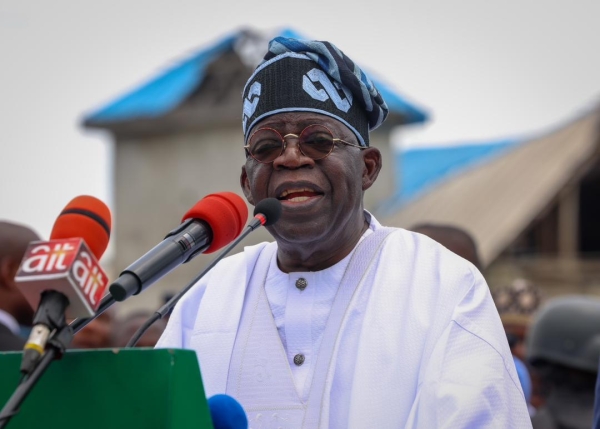

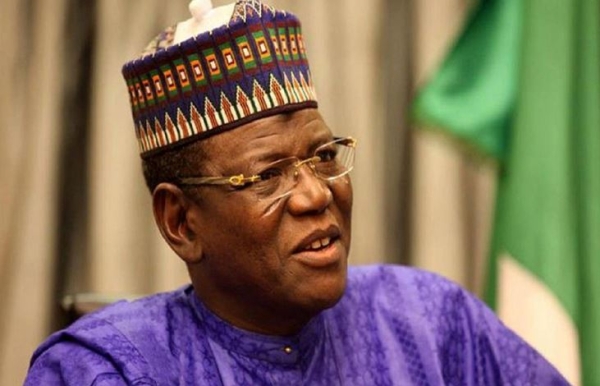
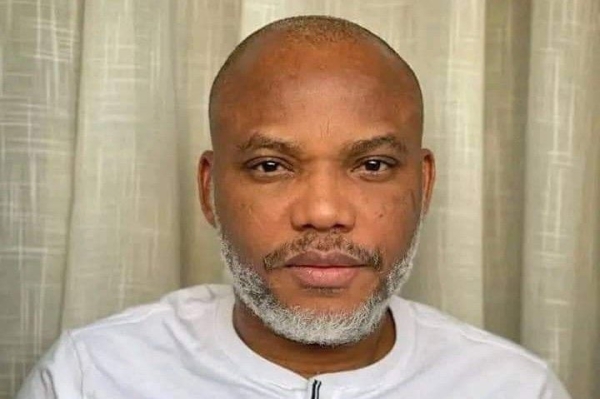
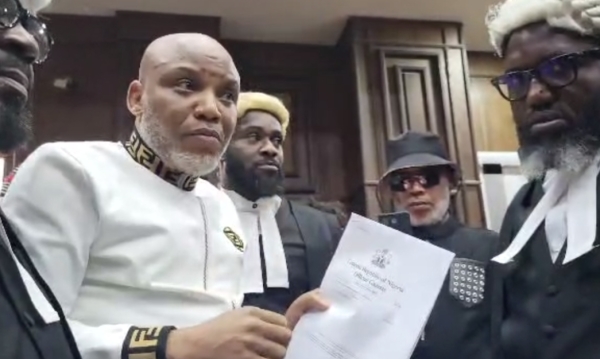
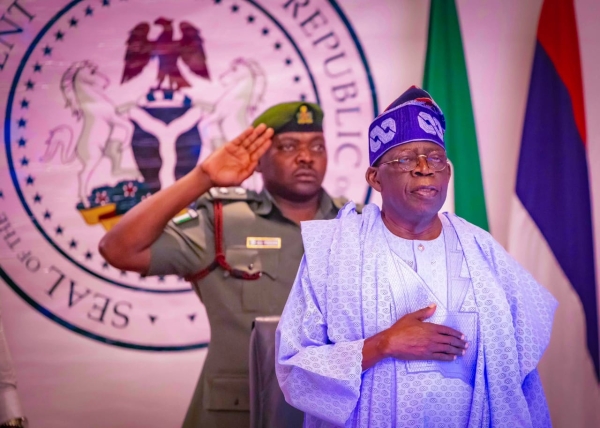

![[OPINION] 26 Years of Democracy by Iberiberism - Olusegun Adeniyi](/media/k2/items/cache/ead66636e3d04914666a031ba3dcd682_XL.jpg)
